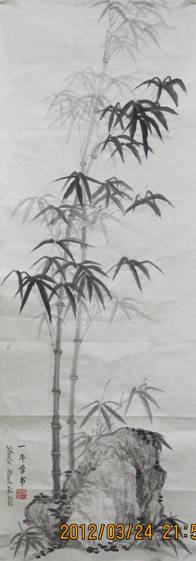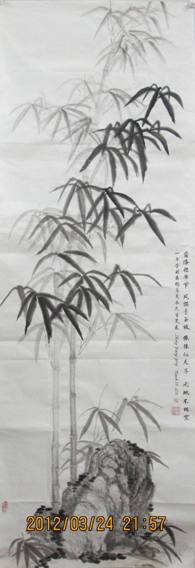 Listen to Shirley Singing the Poem in Chinese Jan 16, 2010
Listen to Shirley Singing the Poem in Chinese Jan 16, 2010 Listen to Shirley Singing the Poem in English Jan 16, 2010
Listen to Shirley Singing the Poem in English Jan 16, 2010 Listen to Shirley Explaining the Poem & Follow Me to Read It
Listen to Shirley Explaining the Poem & Follow Me to Read It Follow Shirley to Read the New Words & the Poem in Chinese
Follow Shirley to Read the New Words & the Poem in Chinese Learn the Meaning of the Poem & Yong Wu Poem
Learn the Meaning of the Poem & Yong Wu Poem See Shirley Created Paintings for the Poem March 22-23, 2012
See Shirley Created Paintings for the Poem March 22-23, 2012 See Shirley Created Picture for the Poem Jan 09, 2010
See Shirley Created Picture for the Poem Jan 09, 2010This is my 66th
Combined Paintingthat I have created / painted for Chinese Classical Poetry, and
my 683rd painting since 2003 ; also, it is my 55th assignment in Chinese National Academy of Arts.
This is a painting from Yuan Dynasty (1279 to 1368), as soon as I saw it, I enjoyed it and I felt it has expressed the meaning of the poem below. But, I did not dare to paint a bamboo for I did not think that my skill good enough to paint it.
But, since I have been not satisfying my first 2 paintings I created for the poem in 2010, and my tutor encouraged me to try to paint from the artists in Qing Dynasty to Ming, Yuan and Song Dynasties … one by one, so I tried to do it twice in CNAA this week.
As usual, I had created music for this poem in 2006, 2007 and 2012. This week, I re-corrected it and tried to sing it in English and in English and in Chinese. Also, I wrote a comment to introduce the poet, the Yong Wu Shi -- the poem that expresses the ideas of the poet via chanting things.
I do hope that my effort will be some help with you to learn Chinese cultures.
The Main Meaning of the PoemTing Zhu
By Liu Yuxi (Tang )
The dew has cleaned the bamboo nodes,
The wind sways the green branches.
The Naturally graceful you are like a gentleman,
Everywhere you are welcome.
Chinese Characters & Pronunciations :
You can clink any Chinese Character to open the New Character Board and to see its Chinese pinyin, meaning, pronunciation and follow me to read it, also, you can hit the links over to enter the Language Column, to see my comments about this poem 庭竹 -- ting zhu
刘禹锡 (唐) -- liu Yuxi (Tang)
露涤铅华节 -- Lù dí qiānhuá jié,
风摇青玉枝 -- fēngyáo qīngyù zhī。
依依似夫子 -- Yīyī sì fūzǐ,wú dì bù xiāngyí
无地不相宜 -- wú dì bù xiāngyí。
How do you think of the two paintings? Which one is better?

If you have any questions, comments or suggestions, welcome to write to
shirley@ebridge.cn or
shirleyz004@yahoo.com ,you can also publish your opinions on
Message Board . :-)
--Shirley Zhang March 25, 2012

 Listen to Shirley Singing the Poem in Chinese Jan 16, 2010
Listen to Shirley Singing the Poem in Chinese Jan 16, 2010 Listen to Shirley Singing the Poem in English Jan 16, 2010
Listen to Shirley Singing the Poem in English Jan 16, 2010 Listen to Shirley Explaining the Poem & Follow Me to Read It
Listen to Shirley Explaining the Poem & Follow Me to Read It Follow Shirley to Read the New Words & the Poem in Chinese
Follow Shirley to Read the New Words & the Poem in Chinese Learn the Meaning of the Poem & Yong Wu Poem
Learn the Meaning of the Poem & Yong Wu Poem See Shirley Created Paintings for the Poem March 22-23, 2012
See Shirley Created Paintings for the Poem March 22-23, 2012 See Shirley Created Picture for the Poem Jan 09, 2010
See Shirley Created Picture for the Poem Jan 09, 2010